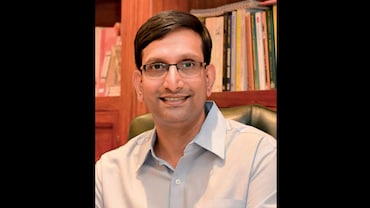- HOME
- /
- Culturescape
- /
- Me & My Shelf
- /
Prayaag Akbar Chooses His Top 10 Books
Prayaag Akbar is the author of the highly-acclaimed dystopic tale, Leila: A Novel, which has recently been made into a Netflix series.

Prayaag Akbar is the author of Leila: A Novel, a dystopic tale set in a possible future, told from the point of view of Shalini, who is looking for her daughter Leila. His first book has been received with widespread acclaim, has won him the 2017 Tata Literature Live! First Book award, and is being made into a Netflix series.
A Pale View of Hills (Kazuo Ishiguro, Faber & Faber, Rs 699)
The author says now that he dislikes the ending, but I was shaken when I realized what this story was truly about. So much lies beneath in every Ishiguro novel: a surface of placid, golden prose, and under that this simmering tension. In his debut work, he perfectly assumes a mother's voice, which inspired me to try it myself.
Waiting for the Barbarians (J. M. Coetzee, Random House UK, Rs 399)
The startling pleasure of your first Coetzee. Bruised by the spare, vivid imagery on the first page, I read it twice again immediately to grasp all he had done. Coetzee's prose is tight and wonderful, with deep understandings transmitted so simply. The modern master.
An Obedient Father (Akhil Sharma, Penguin Books, Rs 399)
As dark as fiction gets. Sharma is brave in taking on the mythology of the Indian family, in exposing the abuse that takes place within our patriarchy, within our homes. Another writer of great economy---never a superfluous word. He captures Delhi with powerful beauty.
Pale Fire (Vladimir Nabokov, Penguin Modern Classics, Rs 699)
It begins with a poem of four cantos that purports to tell part of the story. Then comes a scholar's literary analysis of the poem, which quickly becomes something else, perhaps even a murder mystery. Notable especially for the Russian's mastery over various forms of writing, and his gentle ridicule of the academic establishment to which he himself belonged.
Ghachar Ghochar (Vivek Shanbhag, Harper Perennial, Rs 299)
A fine translation of one of the great Indian novels. Shanbhag writes with such grace and restraint that it seems to carry a multitude of meanings. Almost every person I have discussed this book with has a different reading---private, powerful revelations they arrived at through the book.
English, August (Upamanyu Chatterjee, Faber & Faber, Rs 299)
As soon as I finished this I felt sure I had to try, at least, to write fiction. This novel is wildly funny but it made me sad; it seemed I felt and thought precisely as Agastya did---perhaps the truest sense a writer can evoke in a reader. Dislocation, ennui, the drift of youth. "The mind is restless, Krishna, impetuous, self-willed, hard to train."
The Unconsoled (Kazuo Ishiguro, Faber & Faber, Rs 450)
One of those books that unsettles at the outset and leaves you oddly bereft long after you've put it away. You are never sure what is going on in this novel, and Ishiguro continues playing with the reader until the final word. It was widely mocked at release but is now considered one of his best works.
The Master and Margarita (Mikhail Bulgakov, Penguin Classics, Rs 299)
A sprawling, dazzling work, one of literature's great satires. The devil comes to communist, atheist Moscow and murders the corrupt literary elite. Another section tells of Pontius Pilate and the crucifixion of Christ. Useful to writers as it teaches you never to give up. Bulgakov burnt the manuscript once and started again, finishing it just before he died.
Em and the Big Hoom (Jerry Pinto, Aleph Book Company, Rs 295)
The best fiction is honest. Not that it needs to accurately render some sequence of events, but that it must convey the emotional and intellectual wrangle around the story it is telling. Pinto excavates his characters' lives beautifully here, and captures illness and confinement, and family and trauma in a way I had not till then encountered in Indian fiction.
What Belongs To You (Garth Greenwell, Pan Macmillan India, Rs 550)
The finest thing I read last year. Greenwell converted his award-winning novella into a remarkably assured debut novel. The voice is beautifully literary, with slowly unfurling sentences and thoughts gripping one another like chain links. An exploration of how love can be denied and consumed by privilege and status.
Author's Note: Writing a list like this is enjoyable, but ultimately impossible. There are many books I had to leave out. These are the ones I feel have mattered most at this moment in my life.
Book prices are subject to change. All book details are as seen on Amazon.in.






